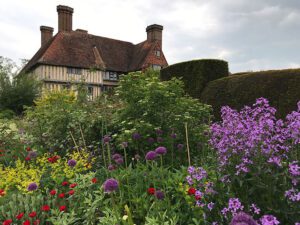June 7 Column: Gardener’s World

Friday nights are a big deal in the Mulvihill household these days. It’s not because it marks the end of the week. Oh no. On Friday nights, we get to watch the BBC gardening program called “Gardener’s World.” It airs in the U.K. every Friday during the growing season. That’s the topic for this week’s garden column, which you can read in The Spokesman-Review. Your job for the week: check out gardening shows. (or you can read my column under this week’s video below)
In order to view the episodes (and all sorts of other wonderful British programming, we have a subscription to Britbox. During most of the season, the programs are an hour long. Let me tell you, they are sheer heaven to watch!
Sure, we could watch the program any day of the week. I think it’s cool to be able to view an episode that British gardeners watched just a few hours before!
Even with COVID-19 restrictions, the programs have continued to be produced each week. This has occasionally required the hosts to film their segments in their gardens by themselves. I am so grateful to the cast and crew of Gardener’s World. They are continuing to provide gardening information during these stressful, complicated times.
For this week’s video, I decided a slideshow of some beautiful English gardens was in order. The photos are of gardens we have visited over the last few years. I hope you will enjoy it!
Gardener’s World garden column:
by Susan Mulvihill
My husband, Bill, and I really enjoy watching the British gardening program, “Gardener’s World.” In the U.K., it airs every Friday night during prime time. The broadcasts are an hour long for most of the garden season. Why can’t we Americans get our gardening fixes like that?
Since I know you’re wondering, you have to subscribe to Britbox in order to view it in the States. We can also watch British mysteries and other programs that don’t air here so I think it’s worth every penny.
Monty Don is the host of “Gardener’s World.” He’s an amiable fellow who is passionate about gardening. The program is filmed in his 2-acre garden known as “Longmeadow” in Herefordshire. I’ve always wanted to give my garden a name but so far, all I can come up with is “Whimpering Pines.” I’m open to suggestions, but I digress.
Monty has created individual garden “rooms” such as the Jewel Garden, the Writing Garden, the Cottage Garden and the Vegetable Garden. Each week, he works in different areas of them while sharing tips, highlighting stunning plants and so on. The program also features profiles of gardeners around the U.K. and visits to amazing gardens that I’ve been adding to my bucket list.
What I love most about “Gardener’s World” is watching Monty and his co-hosts getting their hands dirty, showing us how to grow a wide variety of plants, and teaching viewers new skills. During this coronavirus pandemic, the new programs have continued to air each week despite the challenges of producing them while also practicing social distancing. In each episode, they focus on teaching what new gardeners need to know in order to successfully grow their own food. That is awesome.
Near the end of each episode, Monty enjoys giving viewers a list of “jobs for the weekend.” While Bill likes to feign indignation at being told what to do, I like seeing what British gardeners will soon be up to and comparing it with what we Inland Northwest gardeners need to take care of in our gardens. We have more in common than you might think.
With that in mind, here are your jobs for the weekend. I know I’m a day or two late, but it’s my big chance.
- If you grew amaryllis bulbs indoors during the winter, move them outdoors for the summer. We put our pots on the deck in filtered light, water them each week and we occasionally give them some liquid fertilizer.
- It’s safe to plant basil seeds outdoors. Known for being finicky about chilly temperatures, this herb is well worth growing any time after June first.
- Keep your eyes open for developing insect problems. It you spot something, take the time to identify the bug so you know if any action is required. I’ve been seeing a lot of beneficial insects lately and I know their mission is to help control the bad guys. Please avoid using pesticides. There are plenty of simple, organic methods to address any problems that arise.
- Have you felt envious of your friends’ and neighbors’ blooming bulbs this spring? Believe it or not, the fall bulb catalogs are already coming out so do a little dreaming and planning while there’s still a good selection available.
- Set aside little blocks of time for weeding. The more you keep up with them now, the quicker you’ll get ahead of them.
- Don’t forget to take a break for tea and biscuits.
Cheerio.

